- Home
- Jennifer A. Nielsen
A Night Divided Page 2
A Night Divided Read online
Page 2
The morning after, Fritz showed me the newspaper that described her as a deserter and someone with a weak mind who had believed the lies from the west.
I barely breathed as I read the article, but managed to say, "She died trying to get free! Why don't they care?"
Fritz pointed to the final paragraph, which warned the rest of us not to try the same thing. "They care plenty! Because they want everyone to know hers won't be the only death." His warm brown eyes met mine. "Even children, Gerta."
Soon afterward, the police bricked over all the windows and locked up that building, and every other building that stood along the border. Then they made the decision that something more permanent was needed.
The fence began to be replaced with a concrete wall that was taller, thicker, and stronger. Sharp edges of broken glass were cemented into the top to prevent anyone from climbing over it, and watchtowers were built so fewer officers could guard larger areas. With one stacked block of concrete over another, our prison slowly became a fortress. And all we did was watch it happen.
With each brick, my hopes faded until nothing was left. If there had ever been a chance of Dominic and my father returning, then the wall took that too. My schoolteacher taught us a new song that thanked our leaders for building a wall to keep the fascists out. I muted my glares and only mouthed the words when my teacher was looking -- I couldn't bear to sing the lies.
After a couple of months, the west sent tanks to watch their side of the border, so Russia sent tanks to our side of the border. The soldiers stared at one another through binoculars, each trying to guess which side would fire first. They all had fingers on their triggers.
"One side has to back down or we'll have a third world war," Mama said over dinner one night.
The tone in her voice sent shudders through me, but I still mumbled, "If the west wins that war, Papa could come home."
Fritz kicked me under the table, but it was too late. Mama looked up with eyes widened by dark memories. "If the west wins again, then there'll be nothing to come back to," she said. Her eyes glazed over, and I knew she was remembering the things she had often described to us from the last war -- the nightly bombings, constant hunger, and millions of deaths of both soldiers and civilians. Nobody wanted another war, not even if it brought the wall down.
"We will never be able to leave," Mama said. "The sooner you both accept that, the happier you will be."
I nodded back at her. But I knew I could never again be happy here. And I refused to accept my life inside a prison.
The eye looks, but it is the mind that sees.
-- German proverb
Mama once said the most wonderful thing about being young is our ability to make things normal. That whatever life does to us, no matter how strange, it isn't long before insanity seems ordinary, as if upside down is the way things should be.
That didn't make sense to me at first, but over the next four years after the wall went up, I saw it happen more and more. Most children barely noticed the wall any longer. They played hoops beneath the eyes of armed border guards in their watchtowers, rolled marbles in the shade of the wall, and learned to do as they were told without asking questions.
I was twelve years old now, and the older I got, the more separate I felt from the other kids my age. Because I always noticed the wall. Always. Over the past four years, I had learned to read the guards high up in the watchtowers and know when they were looking and when they had turned away. I knew when and where the guards did their patrols along the border, and where they didn't often go. And more than anything, I knew that nothing happening to us was normal.
The only one who really understood that was Fritz, who said it was because I had Papa's blood in me. Not a single morning had passed in the last four years when I didn't think of my father and the courage he would expect from me.
My walk to school passed very close to the wall, or as close as we were allowed to get anyway. I usually made the walk alongside my only real friend, Anna, who was as timid and shy as I was bold and outspoken. Where I had blond hair, round eyes, and an athletic body, Anna had darker hair, eyes that nearly disappeared when she smiled, and a thin frame that looked as if she needed to be fed. She worked very hard to stay out of trouble, which made her an ideal friend for me. Unfortunately, my ability to avoid trouble was less skilled. I probably wasn't the perfect friend for her.
Today felt uncommonly cold. I was enduring it and hoping not to arrive at school frostbitten. As usual between us, Anna had made the wiser choice. She was wrapped in scarves until there wasn't much visible except for her eyes and mouth. I'd barely remembered my coat.
"There's a Pioneer meeting today," Anna said through what looked like eighteen layers of wool. "Are you going?"
I groaned. We went to school to study letters and numbers, then stayed at school as members of the Pioneers and learned why freedom was overrated, why individuality was bad, and why we must always avoid the evil influences of the west, such as fancy clothes and Beatles music. I loved the Beatles, but not even Anna knew about that. That secret was only for Fritz and me. He had bought one of their albums smuggled in through the black market, and he and I listened to it very low on nights when the streets were crowded and noisy.
"Of course I'm going," I said. Not attending could bring my mother a visit from the school administrators, and none of us wanted that. Over the last four years, we'd already had too many questions from the school, the police, and even the Stasi about my father.
Nothing in East Germany frightened me more than the Stasi. We always knew they were there, even when we couldn't see them. They existed to protect our country from enemies: either foreign spies trying to get in, or traitors who wanted to get out. My family wasn't either, but that didn't mean we were safe.
After my father left, I had thought there'd be no need for them to visit us anymore, but they obviously disagreed. They had last come almost two years ago, late at night, long after we should have been in bed. I think their timing was meant to make us nervous, and from the looks on my family's faces, it worked. Fritz and I had sat on either side of Mama on the couch. While she answered their questions, I kept an eye on their weapons. If they'd only come to ask questions, why did they bring guns?
The Stasi officer who had sat in Papa's old chair was on his second cigarette before the hard questions came.
"Has Aldous Lowe returned to East Berlin?"
I was sure I could hear Mama's heart pounding beside me. Or maybe it was mine, because the officer's tone made it clear that he was no friend to my father. Mama shook her head, and if she was trying to answer in a calm voice, it didn't work. "I have not seen my husband since the wall went up."
"Good," the officer said. "We will arrest him if he does return." He took a long drag on his cigarette. "Does he continue to work against the government?"
"He never did," Mama said.
Another man who had stood by the door walked forward with photos that he placed in her hands. I leaned over just enough to see an old picture of my father and Herr Krause, both with stacks of leaflets in their hands. I didn't know what was on them, but from the terse expression on the officer's face, it was obviously something more than party invitations or store coupons.
Mama quickly handed the photos back. "I have no idea what my husband is doing now. He does not involve us in those activities, and never did."
He never involved Mama or me. But Fritz hadn't looked at the pictures, and I wondered if that was because he already knew what my father had been doing.
"Has Aldous Lowe tried to contact you?" the officer asked.
Mama shook her head, but when she paused for too long, I spoke for her. "We have no letters, and you cut the phone lines to the west on Barbed Wire Sunday."
The officer turned his attention to me. His eyes were like ice on my bare skin. "I cut some of them myself, child. Does that anger you?"
Of course it did, but he had the gun, so I only looked down while Mama made humble apologie
s for my boldness and gripped my wrist like a vise. The Stasi left soon afterward, but even now, two years later, I still felt a chill whenever I thought of them.
Since that night, Mama carefully made sure we did everything that might be expected of a good East German family. We waved our flags at the parades and smiled at the leaders of the GDR -- German Democratic Republic -- our Communist government. Fritz joined the Free German Youth and made plans to enroll at the university one day. And at the beginning of every school year, I joined the Pioneers. With Anna at my side, I participated in their meetings and activities, chanted the slogan to "Be ready -- always ready," and wore the blue scarf and white shirt uniform on every holiday when it was required. If anyone was watching us -- and we suspected they were -- my family now looked as loyal as the best of them.
"Gerta, stop staring at the wall," Anna whispered to me. "Do you think the soldiers don't notice?"
"I think it's too cold for them to bother with me," I said. "They watch the university students, and the men whose families are on the other side. They don't watch twelve-year-old girls on their way to school."
"Yes, they do," Anna insisted. "Turn away, please. Look at anything else."
"At what?" I gestured around me. "There's nothing else to see. With all of this gray around us, it's hard to remember we live in a world of color!"
We called it Communist Gray. It was the color of our buildings, our markets, our streets. The color of the wall. Even the skies were gray today. Somehow the GDR must have figured out how to bleach that out too.
But because I knew it bothered Anna, I stopped looking, and she and I fell into a conversation about the latest hair fashions. It was the sort of conversation two ordinary girls might have on a perfectly ordinary day, even if one of those girls had her mind on something else entirely, as I almost always did.
I became so distracted by my thoughts, in fact, that I barely noticed when Anna stopped talking. I probably wouldn't have realized she had stopped walking either, if she had not spoken my name.
"Gerta, look."
I stopped and turned back to her. To my surprise, Anna stood directly facing the wall.
"Gerta, is that your brother?"
Several meters away, across the large scar of land that had become forbidden territory, a boy stood alone on a platform behind the wall in West Berlin. I usually tried to ignore the westerners on those platforms because they made me feel like an exhibit in a zoo. I didn't want their looks of pity, or sadness, or especially the occasional homesick expression to return to this lesser half of the city. But the boy on the platform seemed to be staring directly at me, and I squinted to see him better.
It had been four years since I had seen Dominic, and he would be fourteen now. Mama kept a picture of him in the front room, and I mentally compared that with the boy now facing me. His face had lengthened and narrowed, but the hair peeking out from his knitted cap seemed about the right color. I would know him if I saw his eyes, but that was impossible from this distance.
Still, there was something in his posture, the way he held one shoulder higher than the other. Dominic used to do that -- I remembered because my mother always reminded him to stand up straight.
It had been a long time since my smile had stretched so wide. "That's him!" I said. "That's my brother!"
He seemed to recognize me too, or at least he waved. I raised my hand back at him, although such a simple gesture was far too casual for the importance of this moment. For almost four years, neither of us had heard a word about the other, and all we could do now was wave in silence?
"Does something over there interest you?"
I turned to see a border guard standing right behind Anna and me, close enough that I could see the stitching of his black gloves. He was shorter than average, with white-blond hair shaved so close to his head that he almost looked bald. He was several years older than Fritz, but there were a lot of patches on his uniform, so I gathered he was more than a low-level officer. His name, stitched onto the uniform, was Muller, and he stared down as if frightening me entertained him.
Muller had come up so quietly that neither of us heard him, but I should've known. Grenzers often patrolled this area; of course my wave to Dominic would've caught one's attention.
Beside me, Anna had turned to stone, or something like it. She wasn't moving, and possibly wasn't breathing either. Not me. I wanted to look up as far as his eyes, stare him in the face, and tell him there was no crime in looking across the wall. More than anything, I wanted to show him I wasn't afraid.
Except that I was. Muller's rifle hung around his shoulder directly in front of me, and he had one hand on the stock. Maybe it was only my imagination, but I could've sworn that the rifle smelled like blood, as if he had used it on someone before. He lifted it over his head and moved his other hand to the trigger.
"I asked you a question," Muller said. "Who were you waving at?"
I turned back, but Dominic had disappeared by then. So I lowered my eyes and said to the officer, "It was nobody, sir."
"You'd better remember that next time someone over there waves at you." He let the cold metal barrel brush against my cheek, then ran it beneath my chin and pushed my head up to face him. "Because those who get too curious about the other side sometimes get a taste of my bullets. Verstehst du?"
I stared into his icy blue eyes and tried not to let any hatred show in mine. "Yes," I whispered, "I understand exactly who you are."
"Then move along. Don't let me catch you stopping here again."
I whispered another thanks to him, which almost immediately began to eat at my sense of justice, then I grabbed Anna's arm. As terrified as I had been, she seemed worse. Her skin was deathly pale and she leaned hard against me as we walked away.
When Officer Muller was out of our sight, Anna released a gasp of air, then said to me, "Promise me you'll never stop there again. No matter who you see on the other side, promise me, Gerta."
Though her reddened eyes begged me to agree with her, I couldn't. Maybe I could promise to be more careful next time I stopped, but that was all. I didn't tell her that -- she'd have launched into a fit of hysterics, which would've brought on Muller's attentions again. So I clutched her arm tighter as we continued to walk. My heart was pounding, just as hers surely was, but for an entirely different reason. All I could think was that after four long years, I had finally seen my brother. And I hoped it wasn't for the last time.
The Germans and I no longer speak the same language.
-- Marlene Dietrich, German actress, 1960
Since both Mama and Fritz worked through the afternoons, it was sometimes my job after school to stop by the market for food. Most things were gone by then, but Mama said that made choosing easier. This was true -- often by the time I got there, the choice was between red cabbage or white cabbage. As if I cared which one went into my basket.
Today I wandered the aisles, hoping something more exciting would be available. I could afford it if there was -- the government kept the prices of everything we might need very low. It's just that the shelves were always more empty than full, and what was on them looked or tasted as gray as everything else. The good food was called Benders -- because if you had something worth trading, the clerk would bend down under the counter to get it for you. But Mama didn't want us bargaining for food. "Just take what is offered on the shelves and come home quickly," she always said.
More than anything, I longed for a banana. We used to have them years ago, and for my twelfth birthday last fall, Fritz had bought one for me off the black market. I still remembered its taste.
Finally, I got some chicken, a few potatoes, and, of course, cabbage. I also picked up a few cans of cola, proudly made in East German factories. Fritz thought it left a bitter aftertaste and said one day he'd smuggle in some "real" western cola for us.
"After that," he said, "you'll never want our cola again."
"If that's true, then don't get it," I had responded. "It'll be one less
thing that I can buy."
Once in line, I stared at the people ahead of me, watching them watch nothing at all because it was safer that way. Mama described us as practical, durable people, which I think she meant as a compliment, though I never took it that way. Our strength came from the collective; every schoolteacher I'd ever had said that until it played in my head like a skipping record. Individuality was a weakness, a sickness of the west. So we all walked in step, eyes ahead, and with conversations at a minimum. We all smiled, but not much, and frowned but rarely cried. Nobody could succeed here, but most people around me seemed to be okay with that. It meant they wouldn't fail either.
I didn't want to be like them. And at the same time, I was beginning to forget how to be different, how to be my own self. It was the feeling of being swallowed up, and I hated it. That was all I thought about as I hurried home with my groceries.
We lived on the fourth floor of a drab apartment building that looked more or less like all the other apartment buildings. That wasn't an accident. Beautiful things were signs of individuality. Wherever possible, Mama had tried to provide some beauty inside the apartment, but still, our furnishings were spare and simple.
With little to look at inside, I went to my room and stared down to the small garden space below. I had buried the peel from Fritz's banana there, hoping it would sprout into a tree this spring. I knew it was impossible, but I still looked every day.
And when the tree wasn't there, I always turned my attention to the wall. If I got the angle just right, I could see into West Berlin.
"There's nothing but greed and selfishness on the other side," my schoolteacher often told us. "If you try to look, it shows nothing but greed and selfishness in your own heart."

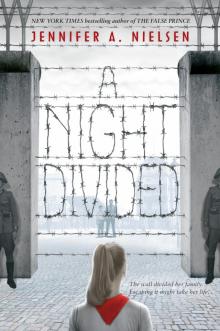 A Night Divided
A Night Divided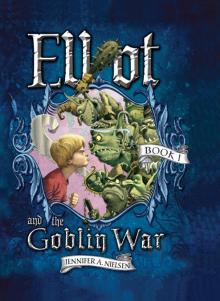 Elliot and the Goblin War
Elliot and the Goblin War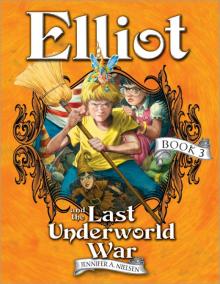 Elliot and the Last Underworld War
Elliot and the Last Underworld War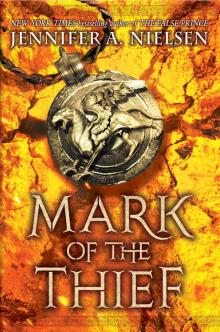 Mark of the Thief
Mark of the Thief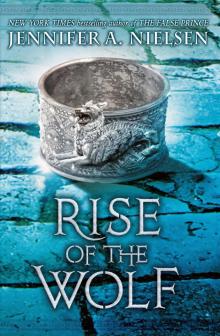 Rise of the Wolf
Rise of the Wolf Elliot and the Pixie Plot
Elliot and the Pixie Plot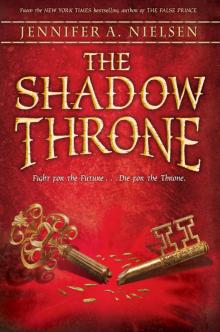 The Shadow Throne
The Shadow Throne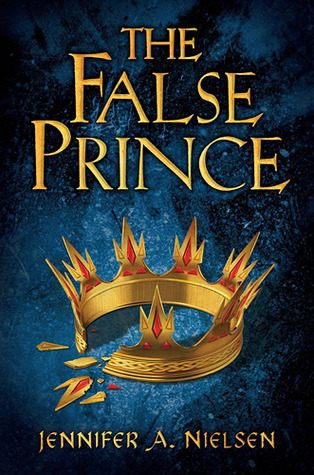 The False Prince
The False Prince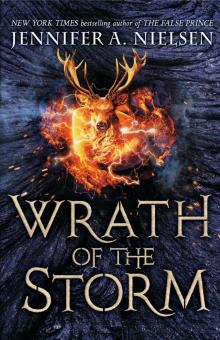 Wrath of the Storm
Wrath of the Storm Deadzone
Deadzone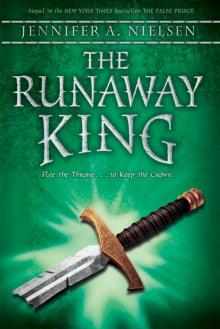 The Runaway King
The Runaway King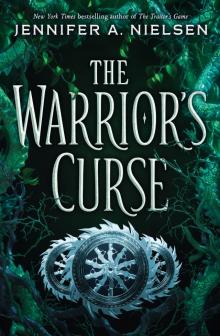 The Warrior's Curse
The Warrior's Curse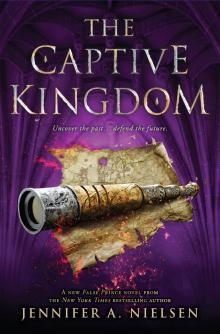 The Captive Kingdom
The Captive Kingdom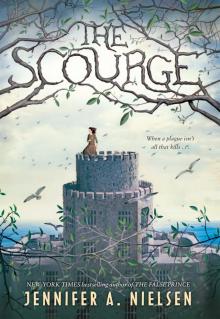 The Scourge
The Scourge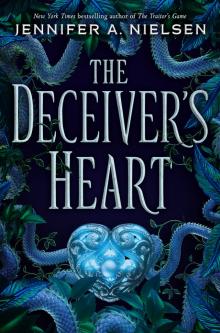 The Deceiver's Heart
The Deceiver's Heart Resistance
Resistance